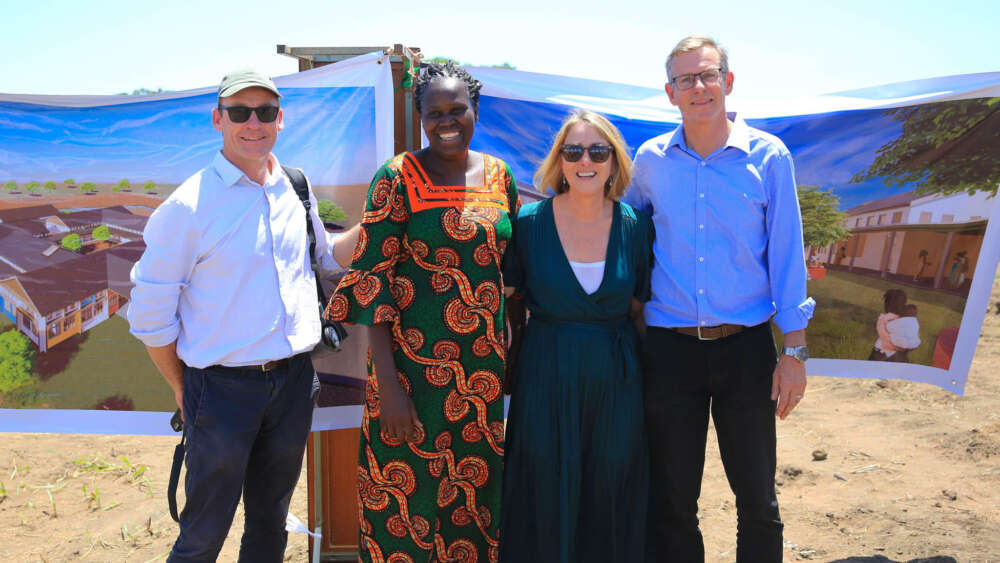When David Heap was studying architecture, a missionary to Africa advised him to retrain as a doctor because, she said, there was “no place for architects on the mission field.”
Now 38 years later, the Sydney architect is finally proving that missionary wrong. David and his wife Julie have just uprooted their lives in Sydney’s northern beaches to move to Uganda as volunteers. Here they are overseeing the building of a new maternity hospital, which David helped to design and raise funds for.
“Finally, there is an opportunity, so God doesn’t waste your time, but it’s not always the timing you expect,” says David, speaking to Eternity via Zoom from Pader, a tiny town in northern Uganda.
“There’s a lot about the Ugandan people that we really admire – they’re easy people to love.” – Julie Heap
It’s a huge adventure for the couple, who have resigned from their jobs, rented out their house, said goodbye to their two daughters, aged 22 and 23, and swapped an affluent life with all the mod cons for a simple lifestyle, where power is intermittent and they shop daily in the local market.
“There’s a lot about the Ugandan people that we really admire – they’re easy people to love, and it’s an easy place to fall in love with,” says Julie, after just two weeks of living in the guest house in Pader.
“What’s difficult, though, is you come here and you realise how affluent our life in Australia is – the fact that we have running water and electricity and we don’t get hungry and we have showers and we have fridges and washing machines.”
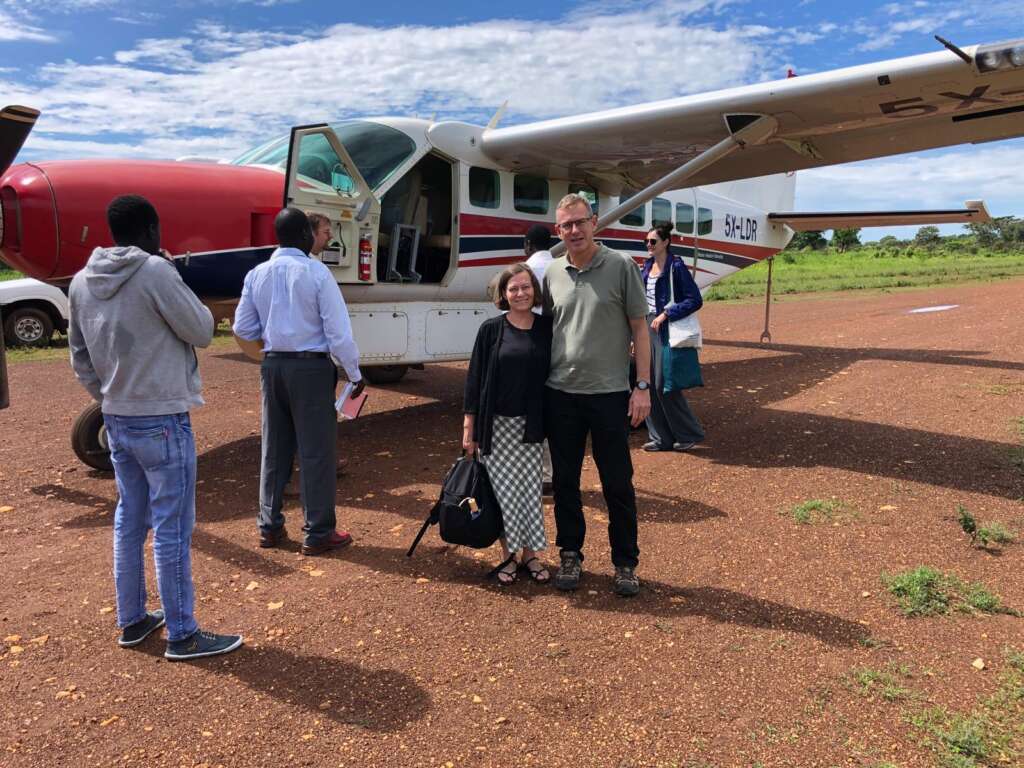
David and Julie Heap arrive in Pader in April on a MAF (Mission Aviation Fellowship) flight.
Julie says most people in the area live in clusters of huts with brick walls and grass roofs, with one hut for cooking, one for the parents, one for the girls and one for the boys.
She feels her work as a chaplain at a women’s refuge in Sydney has been perfect training to reach out to the local women, many of whom have been abandoned by their men and are single mothers. And yet she also feels she knows nothing compared with the strength and resilience of the local women who have to do so much by themselves.
“It’s a job for the women to go and collect water from a bore with the pump and they carry those huge containers on their heads. Sometimes that’s an hour’s walk, and they’ll do that about three times a day,” she marvels.
“Washing is by hand and they cook mostly on a charcoal stove when you squat low in a dark hut – they’re amazing women.”
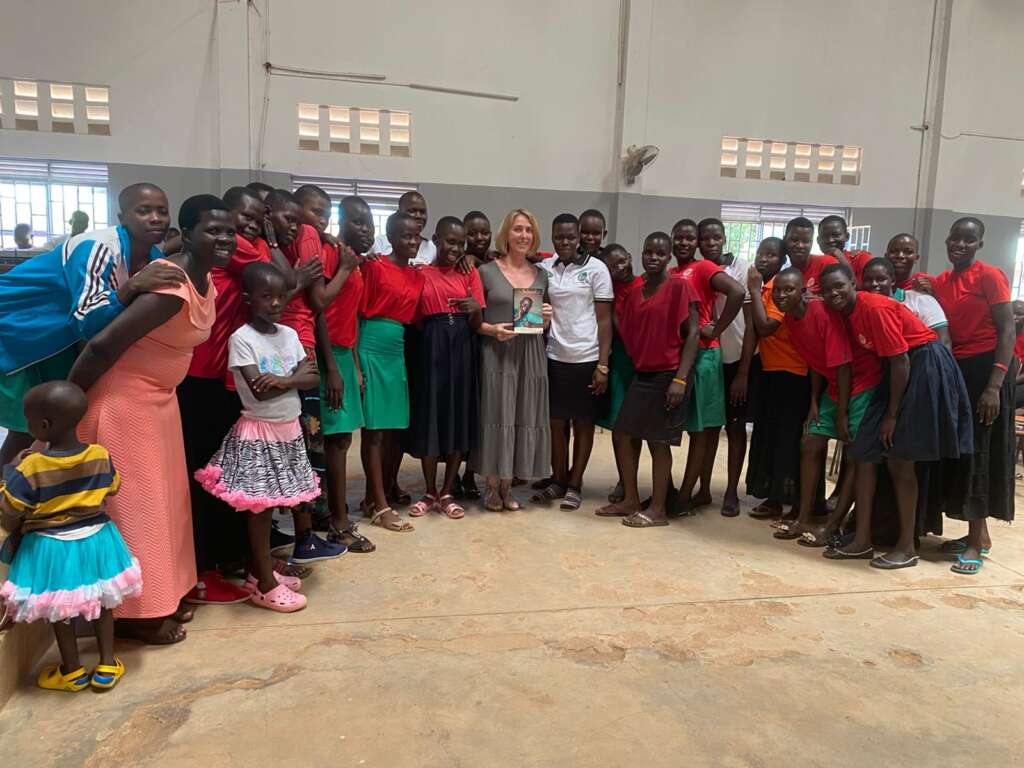
Philippa Tyndale in the Kworo school with her book ‘The School of Restoration’, about Alice’s life and the start of the Te-Kworo Foundation.
Even when the family is solid, the fathers are often away working, so the women have to hoe their fields by hand, she adds. “When you drive around here, there’s women and their children with hoes, sowing the seeds, and it’s very physical work with no equipment.”
Because 69 per cent of Ugandans are self-employed farmers, the income tax base of the country is very low, which results in a lack of infrastructure – “atrocious roads” and few and far between hospitals. That’s why local community-based organisation Te-Kworo is building a maternity hospital in a central location on a bus route about 11kms from Pader.
Te-Kworo Foundation was set up by Alice Achan, who as a teenager spent five years on the run from the brutal Lord’s Resistance Army who terrorised Uganda for 20 years. Afterwards, she nurtured female survivors of sexual violence (which was a trademark of the LRA campaign), counselling child mothers under the shade of a kworo tree. The name Te-Kworo means under the kworo tree. Today, Te-Kworo Foundation provides quality education and maternal healthcare to hundreds of girls every year.
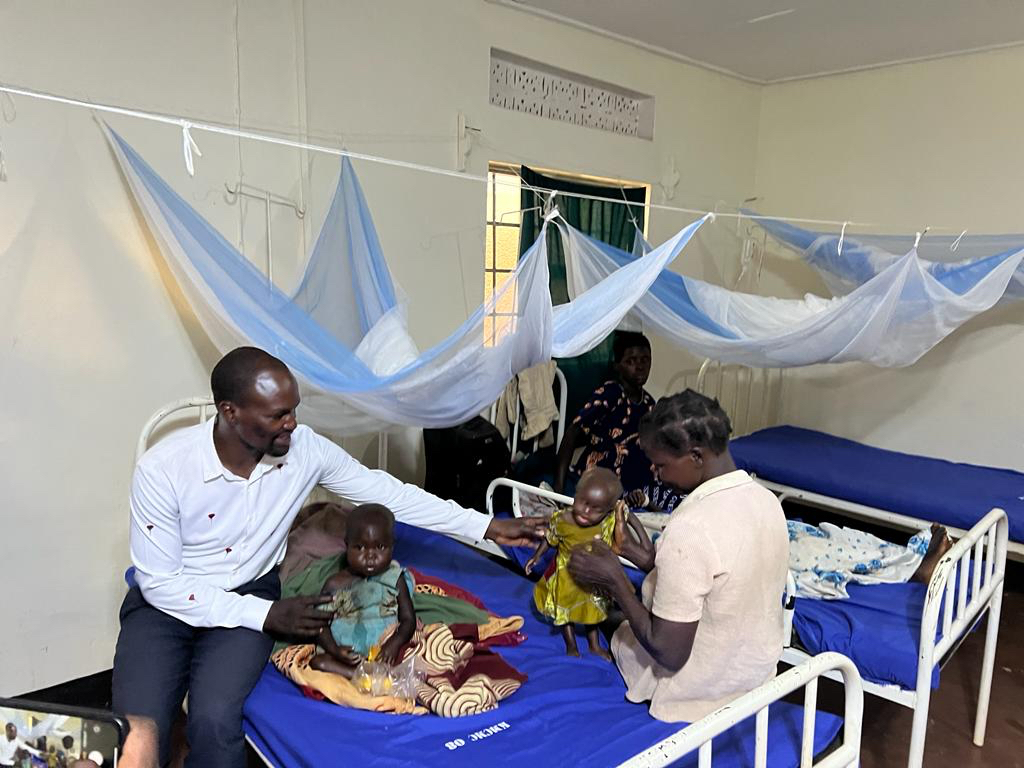
The Kworo clinic in Pader.
Te-Kworo has three secondary schools for girls, with sponsorship programs to try and encourage girls to stay in school, get an education and get work rather than be pregnant at 14. There are a lot of teenage pregnancies in Uganda and some of these result in obstructed labours. In 2017 Te-Kworo opened a maternal health clinic in Pader, which has seen more than 1700 births, but without an operating theatre or a blood bank, and a two-hour transfer to another hospital, mothers and babies were still dying.
“In sub-Saharan Africa, 680 women die every day in childbirth, mostly from preventable causes.” – David Heap
David explains: “It’s just too far to get women to hospital when they have an obstructed birth – and they’re losing mothers. To give you an idea of the statistics, in sub-Saharan Africa, 680 women die every day in childbirth, mostly from preventable causes. If you compare that with Australian figures, the mortality rate would be four women a day.
“So 676 women are dying every day more than they would if they had the same healthcare as in Australia. We lose about 30 women a year in childbirth. If you look worldwide, two-thirds of maternal deaths occur in sub-Saharan Africa. It is disproportionate to the rest of the world, mostly due to a lack of transport, distance to a hospital, poor roads and a lack of quality health care facilities and training.”
Julie adds: “The problem with that is that people don’t have cars. They walk everywhere. Some people have a motorbike, but the people with motorbikes use that as their income to transport other people. A motorbike is an expensive item. Hospitals are few and far between, which means that if you are a woman going into labour and you have trouble, you are unlikely to get to a hospital in time, so there’s a high incidence of women and babies dying.”
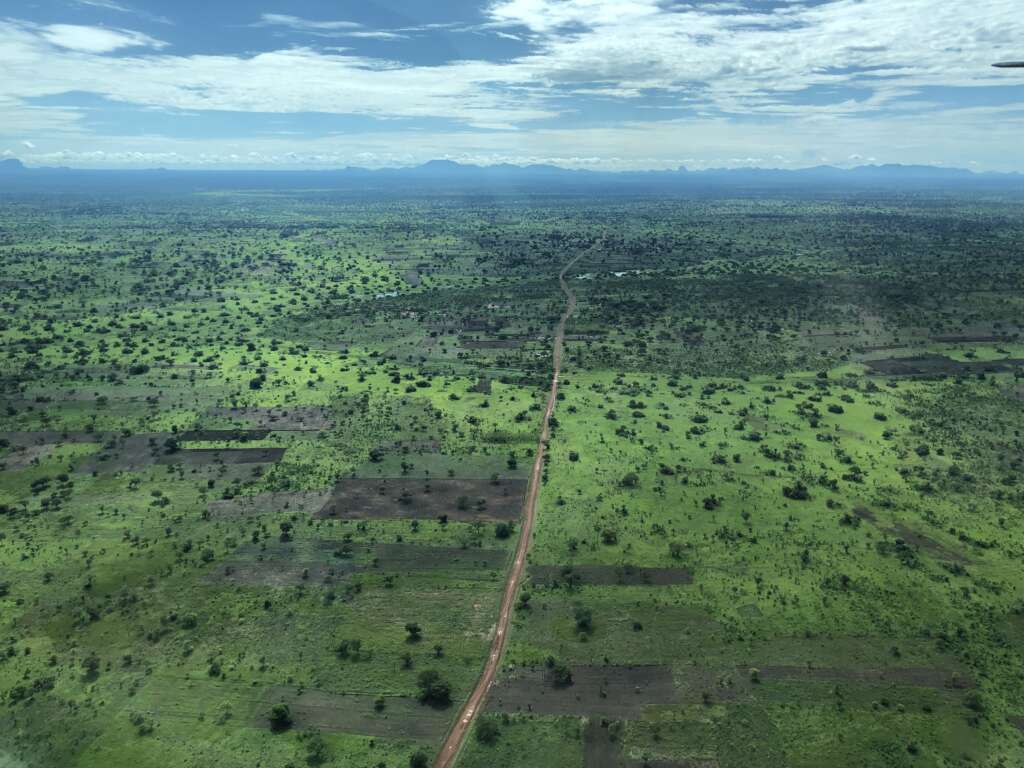
The new hospital site from the air.
David and Julie first heard about Alice Achan’s work in Uganda through their C3 church in Avalon. Alice had been stranded in Australia during COVID when she was here to promote the launch of a book about her life (The School of Restoration by Philippa Tyndale). Alice attended a Bible study group that Julie joined after Alice had returned to Uganda. David and Julie then read Alice’s book, and felt confronted about the situation it described
“It left me a bit up in the air because it’s like, well, what on earth can you do?” says Dave.
A few months later, they heard Alice was developing a maternity hospital in partnership with the Barbara May Foundation, which has already built four maternity hospitals in East Africa.
“I read Dr Browning’s book, A Doctor in Africa, and felt really inspired by the fact that there was some sort of hope, there was something that could be done,” explains David.
“So I discussed this with the firm I was working for, NBRS, and they generously offered to do it as a pro-bono job. They agreed to do the design and the presentation images for the fundraising events. And so I was involved in that process of the design of the hospital along with a team of people in the office. At the end of that, we attended and spoke at the fundraising dinners.
“What’s interesting is that Ridley Smith, the original director of NBRS, had done the extensions to Catherine Hamlin’s Fistula Hospital in Addis Ababa 30 years ago, so there’s a beautiful legacy of work with the people of Africa from NBRS.”
“I think God was calling us to do that, so we offered to go – and they accepted. So we are over here as volunteers.” – David Heap
David now believes God placed him in NBRS to build on that unexpected connection. Yet, he confesses, he tried to resist the voice in his head telling him to volunteer to project manage the building of the Kworo Maternity Hospital.
“The people Barbara May had used in the past on other projects weren’t available to do it. And for a few months, this little voice in my ear said, ‘Maybe you should put your hand up.’ I ignored it. And it wasn’t until October last year, just before we were coming over for a visit, that Julie said, ‘Do you think we should put a hand up for that?’ I said, ‘I’ve been trying to ignore that little voice,’ but I think God was calling us to do that, so we offered to go – and they accepted. So we are over here as volunteers.”
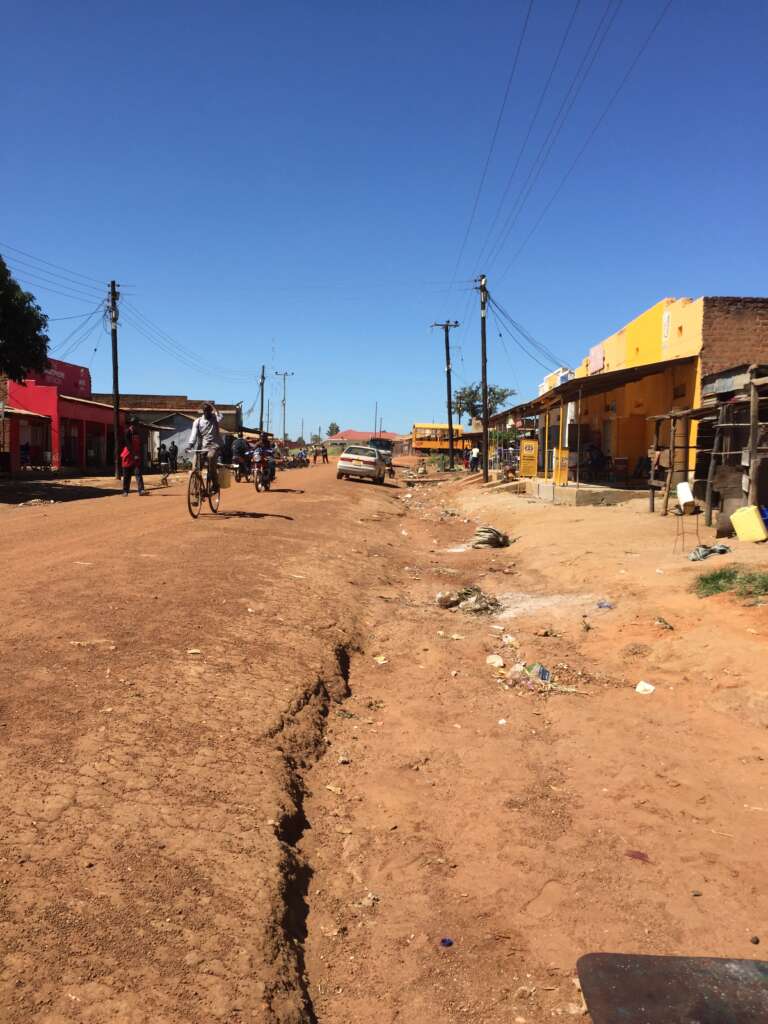
The main street of Pader.
Julie says they had been looking for a long time for a charity they could be involved with beyond just giving money.
“When this came our way, it just felt right from that perspective,” she says.
“It’s funny because I’ve always thought that people that are called to Africa would’ve had that on their heart since they were a child or had a prophetic word spoken over them or had a dream or something, but that has not been the case for us. We haven’t had specifically Africa on our hearts, but we’re really glad that God has brought us here because the Ugandan people are amazing. Culturally, they’re so inspiring, they love to sing and dance, and have a very strong work ethic.”
Though it’s early days, Julie believes God called her as well as David to Pader, and he will lead her when he wants her to serve.
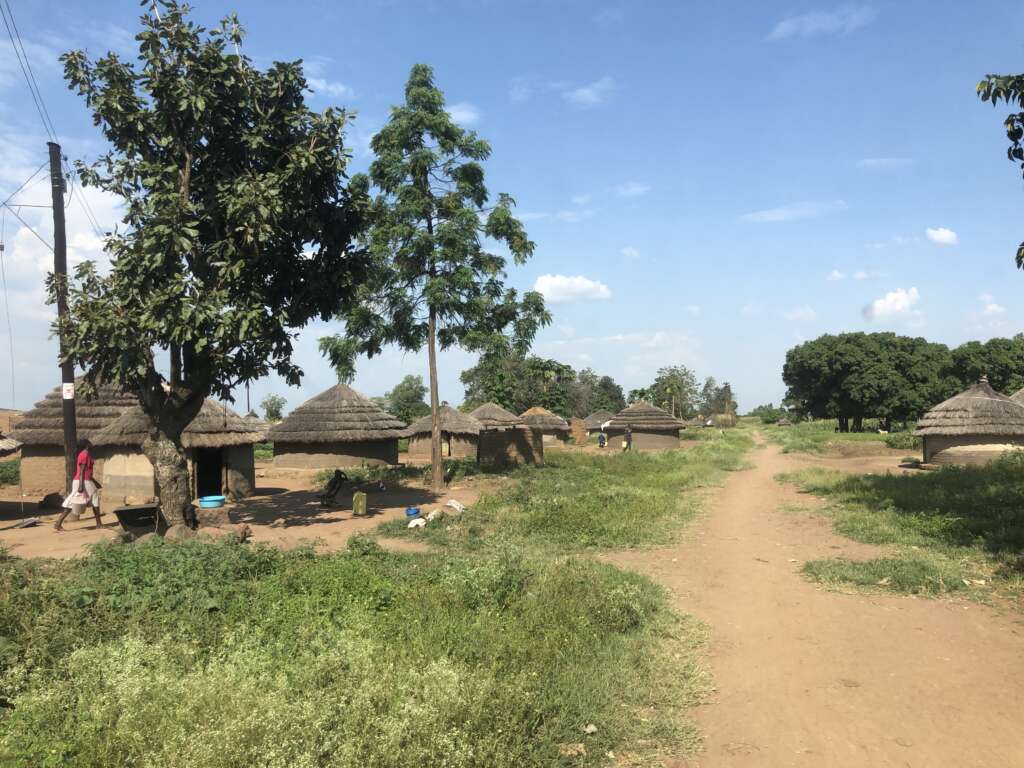
A typical residential street
With the Te-Kworo school next door, she hopes to have the opportunity to interact with its 600 girls, but she also has a heart to assist older women.
“The average life expectancy in Uganda is 62, so if I were living here, I’d probably only have a few years to go,” she notes.
“It’s like everything I’ve studied, done, and know is not completely useless here, but I’ve found I don’t know anything that the women my age here all know how to do. They farm and they know how to cook poshom [maize meal], and I don’t know the language. So it’s very strange.”
Julie asks for prayer that God will reveal his purpose for her in Uganda.
“I know he’s brought us here because we’re going to be doing things that will impact the community, but it goes two ways. I know he’s doing things in us personally and revealing in us, ‘What about that attitude or what about that assumption?’ So a lot has been happening already in the last couple of weeks, which is going to be a lot of personal growth.”
Email This Story
Why not send this to a friend?
